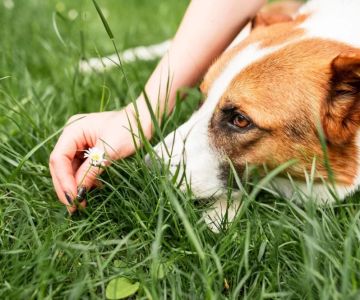Best Dog Foods for Sensitive Stomachs and Skin: Nourishing Your Pet's Health
- 1. Understanding Sensitive Stomachs and Skin in Dogs
- 2. Choosing the Right Dog Food for Sensitive Stomachs
- 3. Best Dog Foods for Sensitive Stomachs and Skin
- 4. Ingredients to Avoid for Dogs with Sensitive Stomachs
- 5. When to Consult Your Vet About Your Dog's Diet
1. Understanding Sensitive Stomachs and Skin in Dogs
Many dogs suffer from sensitive stomachs and skin, which can manifest in symptoms like vomiting, diarrhea, bloating, itching, or dry patches. These issues often stem from food intolerances or allergies, which can make choosing the right food challenging. Understanding the root cause of your dog's sensitivity is crucial in finding the best solution.
Sensitive stomachs in dogs may arise from a variety of factors, including food intolerances, gastrointestinal conditions, or even stress. Similarly, sensitive skin can result from food allergies or environmental triggers, like pollen or dust mites. Therefore, selecting food that supports both digestive health and skin wellness is essential for overall pet comfort and wellbeing.
2. Choosing the Right Dog Food for Sensitive Stomachs
When choosing food for a dog with a sensitive stomach, it's important to look for a balanced diet that is easy to digest and free from ingredients that could exacerbate digestive issues. The best dog foods for sensitive stomachs are typically made with simple, high-quality ingredients that provide easily digestible proteins, carbohydrates, and fats.
Look for foods that feature a single animal protein source, such as chicken, turkey, or fish, to reduce the chance of allergic reactions. Additionally, avoiding common fillers like corn, soy, and wheat can help alleviate stomach upset. Fiber-rich ingredients like pumpkin and sweet potato are often included in sensitive stomach formulas to promote healthy digestion and firm stools.
3. Best Dog Foods for Sensitive Stomachs and Skin
Here are some of the best dog foods specifically designed to address both sensitive stomachs and skin:
- Hill's Science Diet Sensitive Stomach & Skin Chicken Recipe: This formula is packed with prebiotic fiber to support digestion and contains omega-6 fatty acids to promote healthy skin and a shiny coat. It's a highly digestible food that is gentle on your dog’s stomach.
- Royal Canin Veterinary Diet Gastrointestinal Low Fat: Recommended for dogs with sensitive stomachs or gastrointestinal issues, this food is designed to be low in fat, making it easier for dogs to digest while still providing essential nutrients.
- Blue Buffalo Basics Limited Ingredient Diet Turkey & Potato Recipe: With a single protein source (turkey) and easily digestible carbohydrates (potatoes), this food is ideal for dogs with both food sensitivities and skin issues. It also contains pumpkin for added fiber and digestive support.
- Wellness Simple Limited Ingredient Diet Turkey & Oatmeal Recipe: This food is designed for dogs with sensitivities to certain proteins and grains. It is made with turkey and oatmeal, providing a healthy, easily digestible source of protein and carbs.
Each of these options offers a specialized approach to managing both digestive and skin health, making them excellent choices for dogs with sensitive stomachs and skin.
4. Ingredients to Avoid for Dogs with Sensitive Stomachs
When shopping for dog food for sensitive stomachs and skin, it’s just as important to avoid certain ingredients that can trigger digestive upset or allergic reactions. Some ingredients to avoid include:
- By-products: Animal by-products can be harder for dogs to digest and may contribute to gastrointestinal discomfort.
- Artificial colors and flavors: These can cause allergic reactions or irritate sensitive skin and digestive systems.
- Common allergens like wheat, soy, and corn: These ingredients are often used as fillers and can cause inflammation in dogs with food sensitivities or allergies.
- High-fat content: Fatty foods can be harder to digest and may lead to gastrointestinal issues like diarrhea and vomiting.
By reading labels carefully and avoiding these ingredients, you can reduce the risk of further irritation and help keep your dog comfortable.
5. When to Consult Your Vet About Your Dog's Diet
If your dog’s digestive or skin issues persist despite changes in their diet, it’s time to consult a veterinarian. A vet can help diagnose underlying health conditions, such as food allergies, sensitivities, or gastrointestinal disorders, that might be contributing to your dog’s discomfort. They can also recommend a specialized diet or supplement to manage symptoms more effectively.
For dogs with severe food allergies or intolerances, your vet may suggest an elimination diet or prescribe prescription dog food tailored to your dog’s specific needs. A professional assessment can provide a clear path forward and help you ensure that your dog receives the right nutrients to maintain their health.
If you’re looking for guidance on choosing the best food for your dog with a sensitive stomach and skin, visit Hidden Brook Veterinary for expert advice and product recommendations tailored to your pet's needs.











